Get Yourself a Linked Data Piece of WorldCat to Play With
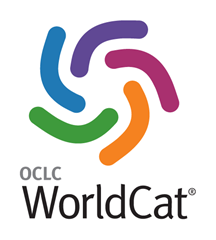
You may remember my frustration a couple of months ago, at being in the air when OCLC announced the addition of Schema.org marked up Linked Data to all resources in WorldCat.org. Those of you who attended the OCLC Linked Data Round Table at IFLA 2012 in Helsinki yesterday, will know that I got my own back on the folks who publish the press releases at OCLC, by announcing the next WorldCat step along the Linked Data road whilst they were still in bed. The Round Table was an excellent very interactive session with Neil Wilson from the British Library, Emmanuelle Bermes from Centre …
Read More ...OCLC WorldCat Linked Data Release – Significant In Many Ways
Typical! Since joining OCLC as Technology Evangelist, I have been preparing myself to be one of the first to blog about the release of linked data describing the hundreds of millions of bibliographic items in WorldCat.org. So where am I when the press release hits the net? 35,000 feet above the North Atlantic heading for LAX, that’s where – life just isn’t fair. By the time I am checked in to my Anahiem hotel, ready for the ALA Conference, this will be old news. Nevertheless it is significant news, significant in many ways. OCLC have been at the leading edge …
Read More ...Schema.org Consensus at SemTechBiz
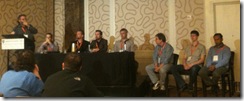
Day three of the Semantic Tech & Business Conference in San Francisco brought us a panel to discuss Schema.org, populated by an impressive array of names and organisations: Ivan Herman, World Wide Web Consortium Alexander Shubin, Yandex Dan Brickley, Schema.org at Google Evan Sandhaus, New York Times Company Jeffrey W. Preston, Disney Interactive Media Group Peter Mika, Yahoo! R.V. Guha, Google Steve Macbeth, Microsoft This well attended panel started with a bit of a crisis – the stage in the room was not large enough to seat all of the participants causing a quick call out for bar seats and …
Read More ...Surfacing at Semtech San Francisco

So where have I been? I announce that I am now working as a Technology Evangelist for the the library behemoth OCLC, and then promptly disappear. The only excuse I have for deserting my followers is that I have been kind of busy getting my feet under the OCLC table, getting to know my new colleagues, the initiatives and projects they are engaged with, the longer term ambitions of the organisation, and of course the more mundane issues of getting my head around the IT, video conferencing, and expense claim procedures. It was therefore great to find myself in San …
Read More ...Richard Wallis Joins OCLC
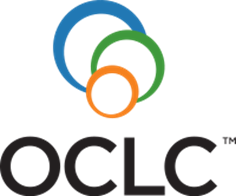
You may have noticed this press release Richard Wallis joins OCLC staff as Technology Evangelist today from OCLC. I have already had some feedback on this move from several people, who almost without exception, have told me that they think it is good move for both OCLC and myself. Which is good, as I agree with them 😉 I have also had several questions about it, mostly beginning with the words why or what. My answers I thought I would share here to give some background. Why a library organisation? – I thought you were trying to move away from …
Read More ...Who Will Be Mostly Right – Wikidata, Schema.org?

Two, on the surface, totally unconnected posts – yet the the same message. Well that’s how they seem to me anyway.
Post 1 – The Problem With Wikidata from Mark Graham writing in the Atlantic. Post 2 – Danbri has moved on – should we follow? by a former colleague Phil Archer.
Read More ...Semantic Search, Discovery, and Serendipity

An ambition for the web is to reflect and assist what we humans do in the real world. Search has only brought us part of the way. By identifying key words in web page text, and links between those pages, it makes a reasonable stab at identifying things that might be related to the keywords we enter.
As I commented recently, Semantic Search messages coming from Google indicate that they are taking significant steps towards the ambition. By harvesting Schema.org described metadata embedded in html
Read More ...Google SEO RDFa and Semantic Search

Today’s Wall Street Journal gives us an insight in to the makeover underway in the Google search department. Over the next few months, Google’s search engine will begin spitting out more than a list of blue Web links. It will also present more facts and direct answers to queries at the top of the search-results page. They are going about this by developing the search engine [that] will better match search queries with a database containing hundreds of millions of “entities”—people, places and things—which the company has quietly amassed in the past two years. The ‘amassing’ got a kick start …
Read More ...The Pointless Search for the Killer App

Why is it those sceptical about a new technology resort, within a very few sentences, to the show me the Killer App line. As if the appearance of, a gold-star approved by the bloggerati, example of something useful implemented in said technology is going to change their mind.
Read More ...Linked Data a Recipe for Food?

What relevance does Linked Data have for a City’s food supply you may ask. “We live in a world where the agri-food supply chain, from producer all the way through to final consumer, is extremely inefficient in the flow of knowledge.. ..with the application of Semantic Web and Linked Data technologies along the food supply chain, it will make it easier for all actors along there to know more about where their food comes from and where their food goes.”
Read More ...Libraries Through the Linked Data Telescope

Linked Data and Linked Open Data have arrived on the library agenda. The consequence of this rise interest in library Linked Data is that the community is now exploring and debating how to migrate library records from formats such as Marc into this new RDF. In my opinion there is a great danger here of getting bogged down in the detail of how to represent every scintilla of information from a library record in every linked data view.
Read More ...Is Linked Data DIY a Good Idea?

Most Semantic Web and Linked Data enthusiasts will tell you that Linked Data is not rocket science, and it is not. They will tell you that RDF is one of the simplest data forms for describing things, and they are right. They will tell you that adopting Linked Data makes merging disparate datasets much easier to do, and it does. They will say that publishing persistent globally addressable URIs (identifiers) for your things and concepts will make it easier for others to reference and share them, it will. They will tell you that it will enable you to add value …
Read More ...Free Data for 2.4 Million European Culture Heritage Items
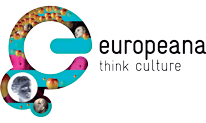
Europeana recently launched an excellent short animation explaining what Linked Open Data is and why it’s a good thing, both for users and for data providers. They did this in support of the release of a large amount of Linked Open Data describing cultural heritage assets held in Libraries, Museums, Galleries and other institutions across Europe. The significant elements in the press release, from Europeana Professional (Europeana’s professional knowledge-sharing platform), are that they are releasing data for 2.4 million items, under a CC0 open data license, and it is Linked Data in RDF. This is a wonderful resource, and example …
Read More ...A 3 Minute Introduction to Linked Data
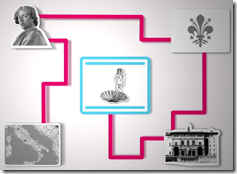
Europeana have launched a video. An excellent video animation explaining what Linked Open Data is and why it’s a good thing, both for users and for data providers. Checkout the video and drop it in to your favourites ready to send to anyone who asks the what is Linked Data question.
Read More ...A Data 7th Wave Approaching

I believe Data, or more precisely changes in how we create, consume, and interact with data, has the potential to deliver a seventh wave impact. With the advent of many data associated advances, variously labelled Big Data, Social Networking, Open Data, Cloud Services, Linked Data, Microformats, Microdata, Semantic Web, Enterprise Data, it is now venturing beyond those closed systems into the wider world. It is precisely because these trends have been around for a while, and are starting to mature and influence each other, that they are building to form something really significant.
Read More ...Step Back from the XML – RDF Modelling

I have watched many flounder when they first try to get their head around describing the things they already know in this new Linked Data format, RDF. Just like moving house, we initially grasp for the familiar and that might not always be helpful. This is is where stepping back from the XML is a good idea. XML is only one encoding/transmission format for RDF
Read More ...A School for Data Wranglers
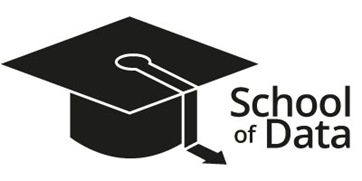
The Open Knowledge Foundation in association with the Peer 2 Peer University have announced plans to launch a School of Data, to increase the skill base for Data Wranglers, and scientists. This is welcome, not just because they are doing it but also, because of who they are and the direction they are taking.
Read More ...WikiData – Announcing Wikipedia’s Next Big Thing

One of the more eagerly awaited presentations at the Semantic Tech & Business Conference in Berlin today was a late addition to the program from Denny Vrandecic. With the prominence of Dbpedia in the Linked Open Data Cloud, anything new from Wikipedia with data in it was bound to attract attention, and we were not disappointed. Denny started by telling us that from March he would be moving to Berlin to work for the Wikimedia Foundation on WikiData. He then went on to explain that the rich Wikipedia resource may have much of the world’s information but does not have …
Read More ...A Kasabi Day at Semtech Berlin

I spent yesterday at the first day of excellent Semantic Tech and Business Conference 2012 in Berlin. It was a good day covering a wide range of topics, a great range of speakers and talks, and most encouragingly some really good conversations in the breaks. I had the pleasure of presenting the opening session The Simple Power of the Link which seemed to provide a good grounding introduction to what to some is a fairly complex topic. My slides are available on Slideshare, and I provided a background article on semanticweb.com, if you want to check them out. In my …
Read More ...A Video Conversation
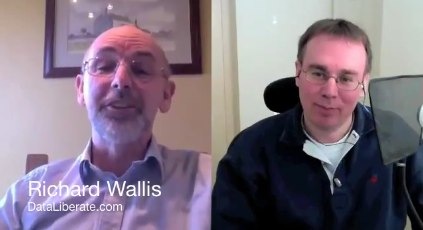
Today I share a conversation with my good friend and former colleague Paul Miller of Cloud of Data. Paul is a prolific podcaster, but had yet to venture in to the world of the video conversation. This conversation was therefore a bit of an experiment. Take a look below and see what you think. For those that prefer audio only, Paul has helpfully included an mp3 for you to listen to. At the end of this post you will also find a link to a short survey which has posted to ascertain how successful this format. In the conversation itself …
Read More ...